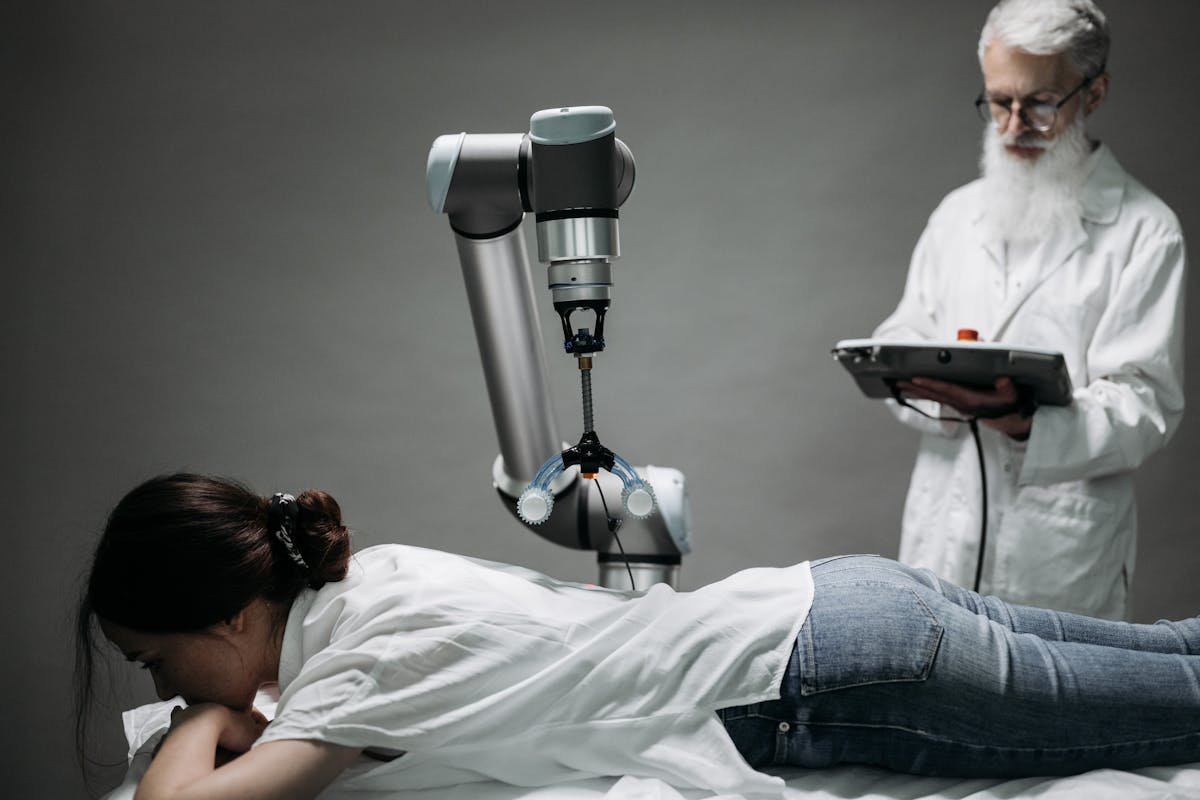AI Doctors Are Coming—But Do They Care About You or Just the Code?
Healthcare / Date: 06-23-2025

Here’s a harsh truth you probably didn’t see coming: Your next doctor might not be human. And guess what? They won’t make eye contact, ask how your kids are doing, or notice the tremble in your hands—unless the algorithm is trained to spot it. Sounds efficient, maybe. But also a little terrifying, right?
In this post, we’re pulling back the curtain on the rise of AI in medicine. You’ll discover how machine doctors are changing hospitals, what they’re good (and terrible) at, and the one question nobody’s asking: Will they treat you like a person—or just a set of data points?
Why the Future of Healthcare Might Feel Less Human

The AI Invasion Isn’t Coming—It’s Already Here
Let’s clear something up. This isn’t science fiction. AI is already diagnosing diseases, reviewing x-rays, and recommending treatments faster than most human doctors can. In fact, some tools can detect cancer cells with better accuracy than trained radiologists.
Sounds amazing, sure. But here’s the twist: Doctors aren’t just diagnosis machines. They comfort. They connect. They care. Can an AI really do that—or is it just pretending?
Hospitals Are Getting Smarter… But Colder?
From smart beds that track your vitals to robotic nurses delivering meds, hospitals are becoming high-tech hubs. Everything's optimized. Streamlined. Clean. But also—strangely sterile.
Many patients are already noticing the shift. Less face time. More screen time. Some don’t even see their doctor anymore—just a chatbot that says, “We’re here for you,” while mining their data for patterns.
Efficient? Absolutely.
Warm? Not even a little.
The Algorithm Has No Bedside Manner
AI Might Know Your Symptoms—But Not Your Story
Think about this. You come in with a headache. A human doctor might ask: Have you been stressed? Sleeping okay? Lost someone recently?
An AI? It checks your vitals, your history, your scan data—and spits out “likely tension headache.” Done.
That’s the problem. Algorithms don’t feel. They don’t notice subtle emotions or odd little things that don’t fit a box. They can’t tell if you're downplaying your pain because you're scared. Or lying about smoking because your kid's in the room.
What Happens When the Algorithm Gets It Wrong?
Furthermore, let's not assume that these systems are flawless. The quality of the data we give them determines how good they are. And health information? It's disorganized. biased. frequently incorrect.
If AI gets it wrong, who’s to blame? The hospital? The coder? The machine?
Worse, what happens when patients blindly trust it? Imagine a future where the doctor says, “Sorry, but the system flagged you as low-risk,” even though your gut screams something's wrong.
Sound far-fetched? It’s already happening in some hospitals—just quietly.
Here's the Twist: Some Patients Prefer AI
No Judgement. No Bias. No Small Talk.
Believe it or not, some people want AI doctors. Why? Because machines don’t judge. They don’t get tired. They don’t rush through appointments.
For people with anxiety, trauma, or stigma-related conditions, AI can feel safer. One woman with obesity said she preferred an AI nutritionist because it didn’t make her feel ashamed. Another patient liked getting sexual health advice from a chatbot—no awkward stares.
So yes, there are perks to robot care. But there’s a catch.
Your Health Data Is the New Gold Rush
AI Doctors Learn From You—Whether You Like It or Not
Here’s something the billboards don’t say: Every time you go to the doctor, your data might be feeding an algorithm. Your heart rate. Your bloodwork. Your mental health scores.
It’s all fuel for the machine.
And who owns that data? You? The hospital? The tech company?
Welcome to medicine’s new moral mess: You’re not just a patient. You’re a product.
Privacy? What Privacy?
Let’s say an AI system notices signs of early dementia from your search history or prescription records. Should your employer know? Your insurance company? Your kids?
Once data flows into AI systems, it’s hard to pull back. And laws? Still catching up.
The risk is simple: We could fix one problem (slow, expensive healthcare) and create another (a privacy nightmare no one agreed to).
So, What’s the Future of Being "Cared For"?
Will Doctors Become Data Managers?
Picture this: In the future, your doctor might not diagnose anything. They’ll just interpret what the AI tells them. More translator than healer.
That means medical school will change. Soft skills might fade. Tech literacy becomes king.
But here’s the kicker… If the AI starts outperforming doctors, do we even need doctors at all? Or just a few techies and a support chatbot?
Scary thought—but one we need to talk about now, not later.
Could AI Make Healthcare More Human?
Some experts, ironically, agree. Doctors may potentially have more time to spend with patients if machines take over tedious tasks like scheduling, charting, and scans.
Less paperwork. More eye contact.
That’s the hopeful version of the future. But it depends on how we use the tech—not just how advanced it gets.
The Bottom Line?
AI doctors are coming—faster than we’re ready for. They’ll diagnose faster, cost less, and maybe save more lives. But if we’re not careful, we could lose something bigger: care that actually feels human.
So, the big question is:
Will you let the algorithm decide your fate—or demand a doctor who looks you in the eye?
Follow Us
Newsletter
Subscribe to our newsletter to stay updated with our latest news and offers.
We respect your privacy.Trending










